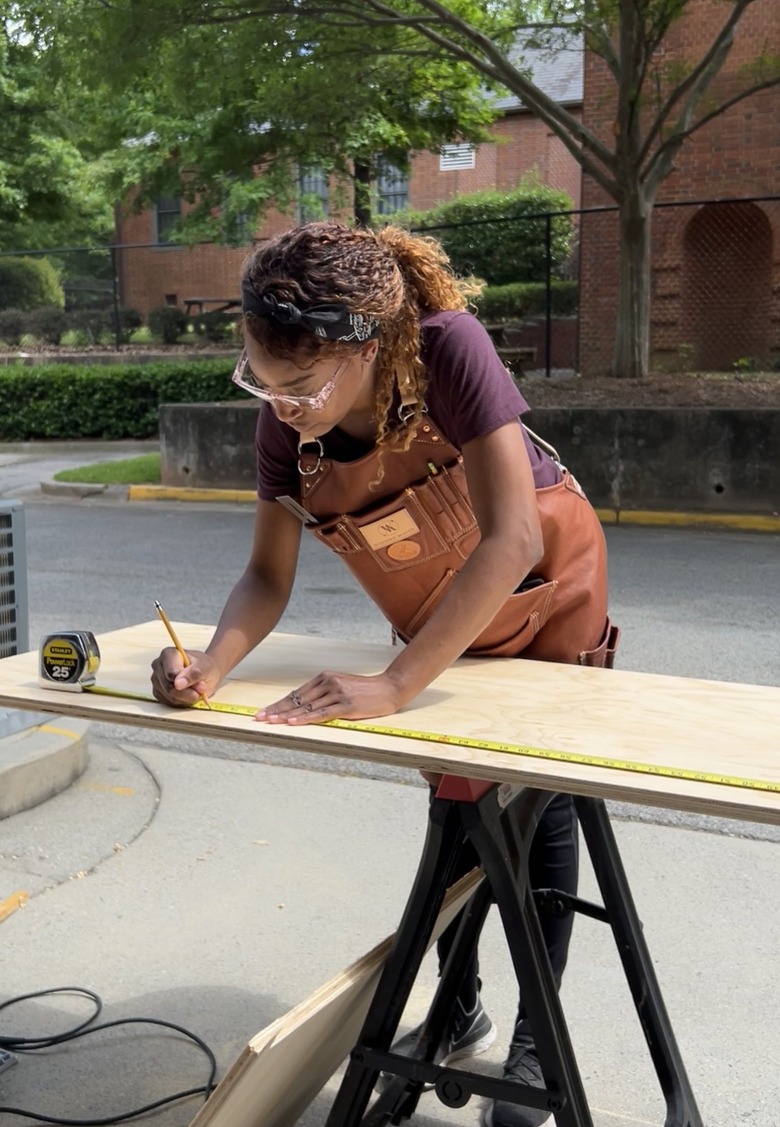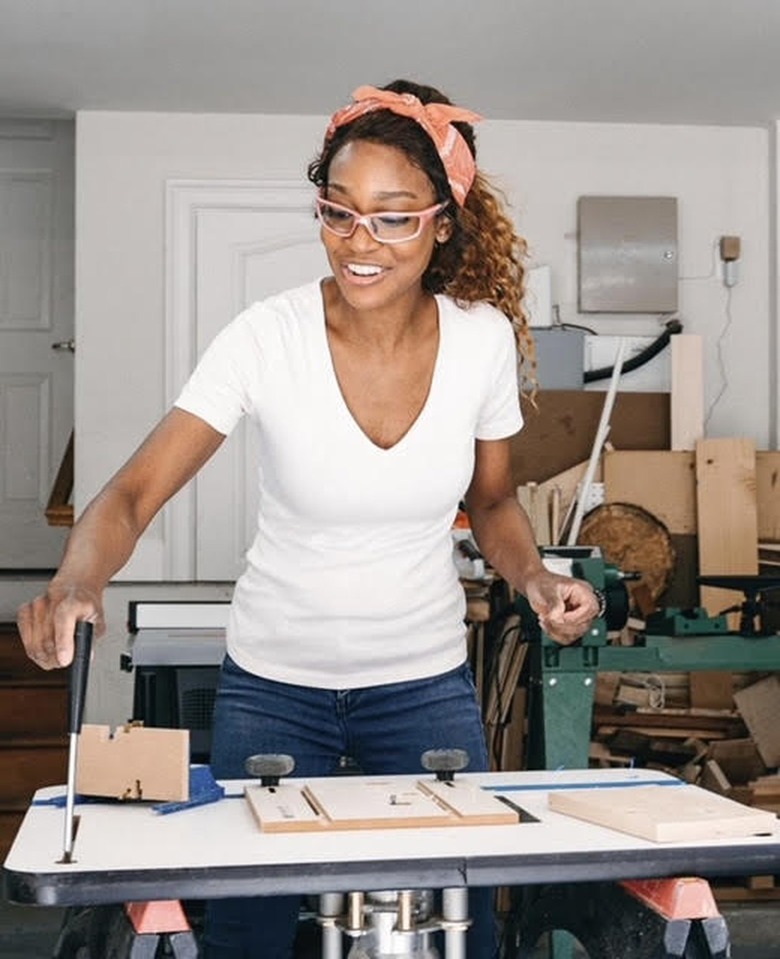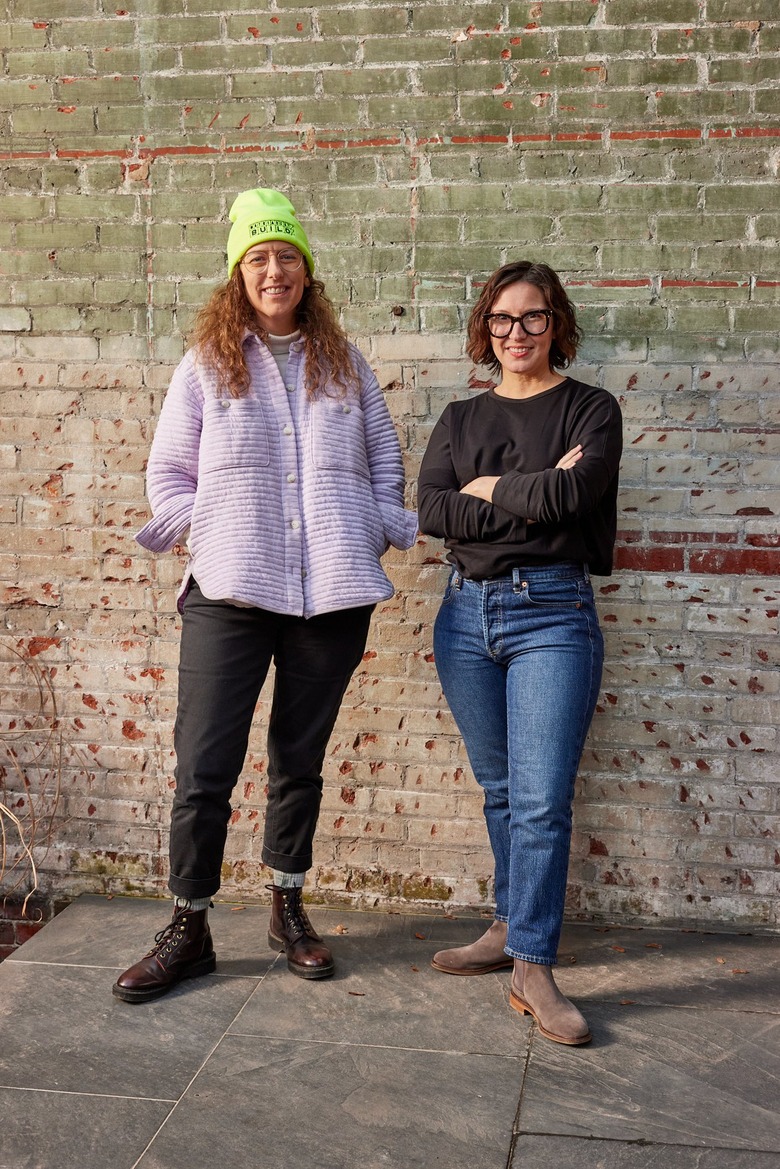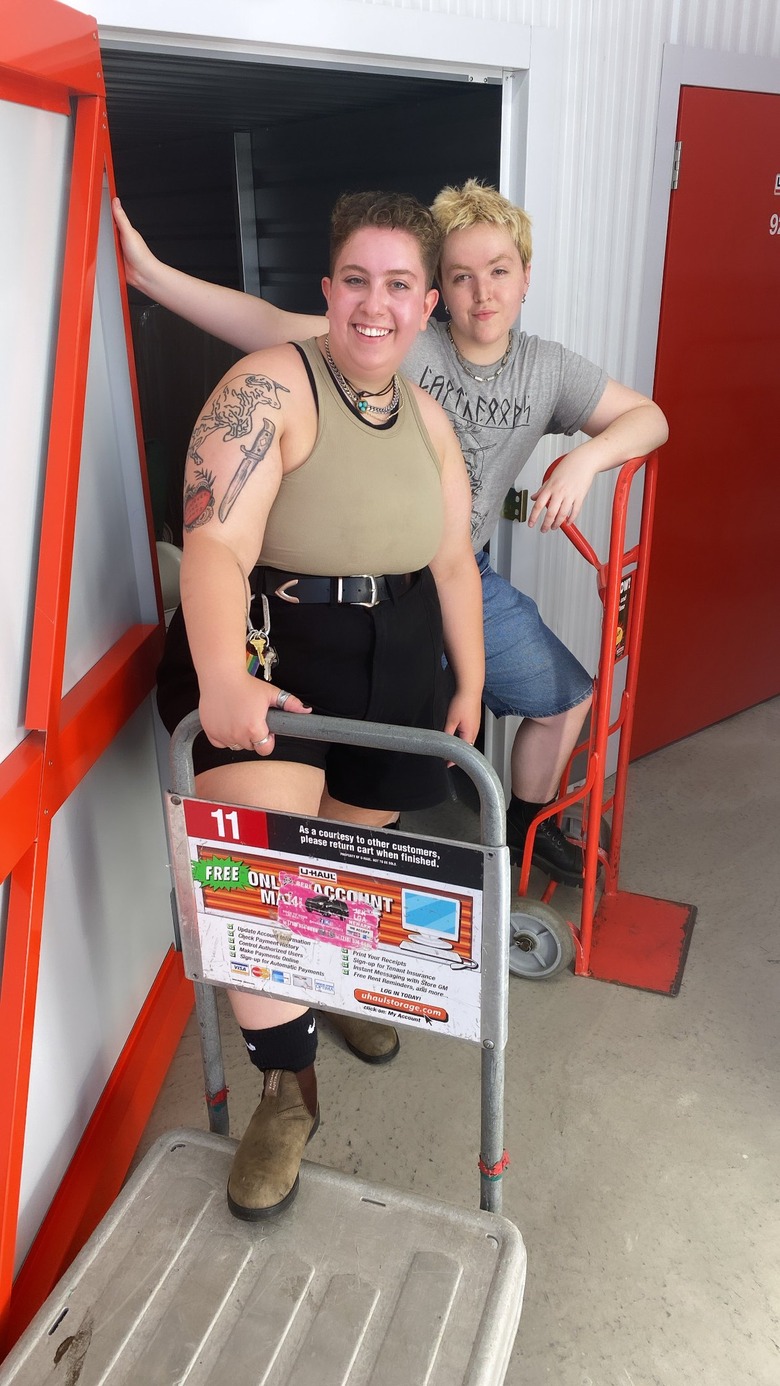Women And Queer Tradespeople Are Reconstructing The Future Of Their Industry
For Char Miller-King of The Wooden Maven, woodworking was love at first build. Years ago, the Decatur, Georgia-based woodshop educator decided to try to recreate an expensive bed frame she loved but couldn't afford. She was in her early 20s at the time and had no carpentry experience, but powered through with some advice from her uncle, a drill she borrowed from her boss, and sheer determination.
"I put that bed together and slept on it for seven years," she tells Hunker.
From then on, Miller-King devoted all of her spare time to woodshop projects, honing her craft as a side gig to her corporate job. The work fulfilled her creatively, but the self-described social butterfly struggled to find community. There weren't many women woodworkers in her area, let alone other Black women, and walking into all-male, mostly white spaces made her feel "a little uncomfortable."
Everything changed in 2017, when Miller-King made her first Instagram account. She had recently given birth to twins and left her corporate job with nothing else lined up. With tradespeople from around the world just a hashtag away, her network expanded exponentially. "I found the woodworkers I wanted to know 15 years ago — women, other parents, people of color," she shares. Just a few months later, she founded The Wooden Maven to pursue woodshop education full-time.
Miller-King's success in this space is no small feat. To this day, the skilled trades, which include professions like construction, carpentry, and plumbing, are largely male-dominated. Antiquated gender roles and institutional gatekeeping have colluded to create a culture where many women and queer people simply don't feel welcome. And those who do break into the industry often encounter frustrating hurdles, such as pay discrepancies or sexual harassment.
According to 2019 data from the United States Department of Labor, women account for just 8.1% of the country's 779,567 full-time construction managers. Their median earnings are nearly $11,000 less than their male counterparts. These gender gaps are even wider in certain trades — take plumbing, pipefitting, and steamfitting, for instance, which has a 99% male workforce.
But the tide is beginning to turn. The internet and social media have democratized information about the trades, allowing women who are curious about these professions to teach themselves basic skills, research formal training options, and share stories with other tradespeople who share their lived experience. Even though they are underrepresented, women in the trades are no longer siloed or invisible.
In a 2020 report, the Institute for Women's Policy Research (IWPR) estimated that a record-high 300,000 American women now work in the trades. And women- and queer-led handy services — another traditionally male-dominated space — are booming in different cities throughout the country. By carving out space for themselves, Miller-King and her peers are fostering a more welcoming environment for other women and queer tradespeople to come.
How the trades became “men’s work”
How the trades became "men's work"
For most of us, the word "tradespeople" probably conjures up images of rugged, loud-mouthed men in coveralls. You might even opt for the gendered term "tradesman" or use a phrase like "I know a guy" when recommending your go-to plumber or electrician. Yes, the skilled trades have long been male-dominated, but this glaring instance of gender inequity is an indictment of the culture within and surrounding the trades, not women's ability to carry out these jobs.
A quick look back at our nation's history reveals a rich legacy of women in the trades. During World War II, legions of women across the United States took on physically demanding factory jobs to manufacture war materials while men fought overseas. By 1945, nearly one-fourth of all married women worked outside the home.
This marked the first instance of American women entering the workforce en masse. Government messaging positioned these women workers as patriotic heroes, subverting all cultural scripts about women's innate frailty or lack of belonging in the public sphere. When Rosie the Riveter said "we can do it," she was right.
Alas, once the war ended, most women factory workers were fired from their posts to make room for men returning home from the frontlines. The message was clear: This was men's work, and even if women could do it, they were better suited for motherhood and home life. (Never mind that the wages women earned while their husbands were at war often kept their families afloat.)
"'Picking up heavy equipment — that's a man's job. You're small and dainty, so we don't want you to do that.' And eventually, women start to believe that we're not even capable of doing it." — Char Miller-King of The Wooden Maven
These gender norms have largely persisted, albeit more covertly since the turn of the century. They continue to deter women who feel drawn to working with their hands or pursuing a career as a tradesperson or handy worker. Gone are the days when practical skills like woodshop were included in most public school curriculums. Young women today are expected to attend college, not vocational school, and work at a desk, not a woodshop bench.
It doesn't help that these gender roles are reinforced by popular media. Even in television shows about home renovation, contractors are disproportionately "attractive white men," Miller-King points out. Women are more likely to be depicted as interior designers.
"The lines have become very separate between what boys should do and what girls should do," she continues. "Because if [women] are to be seen and liked and adored, we have to be beautiful. We have to be thin; we have to have fair skin; and our nails have to be done. We can't be like what a man is traditionally. 'Picking up heavy equipment — that's a man's job. You're small and dainty, so we don't want you to do that.' And eventually, women start to believe that we're not even capable of doing it."
Fear of harassment on the job is often a deterrent, too, and rightfully so. The aforementioned IWPR report from 2020 polled more than 2,600 tradeswomen about their personal experiences in the industry. About one-fourth of the women surveyed said they are "always or frequently harassed" because of their gender. Nineteen percent of LGBTQ respondents also reported consistent harassment based on their sexual orientation.
Beth Pointer, a Baltimore-based general contractor and owner of Done Construction, is acutely aware of this struggle. Earlier this year, she and her team interviewed 12 candidates to fill an apprenticeship opening at the company. Ten of those candidates were women, and "every single one" said they were eager to break into the trades but scared of being sexually harassed by male coworkers.
"In general, people at an apprenticeship level are treated poorly in the trades as a right of passage, a sort of hazing. And women don't want to put up with that shit. Queer people don't want to put up with that shit. Because it can feel so much more dangerous as a woman, as a person of color, as a queer person." — Beth Pointer of Done Construction
"In general, people at an apprenticeship level are treated poorly in the trades as a right of passage, a sort of hazing," she tells Hunker. "And women don't want to put up with that shit. Queer people don't want to put up with that shit. Because it can feel so much more dangerous as a woman, as a person of color, as a queer person."
The kicker? These toxic attitudes are also off-putting to potential customers. Pointer says many of her clients hire Done Construction because her contractors aren't condescending or judgmental — or mansplainers. "A lot of the clients we have are men," she explains, "and a lot of these guys have had terrible experiences with men in the trades. The patriarchy is bad to everyone."
Moving toward a more inclusive future
Moving toward a more inclusive future
Despite these ongoing obstacles, women are joining the trades in record numbers. The mid-2010s saw a particularly notable uptick in women construction workers. It's due at least in part to intentional efforts by industry groups like Chicago Women in Trades (CWIT) to recruit women workers, but in order to retain them, the overarching culture needs to change. Women and queer people in the trades deserve to thrive, not just survive.
Matriarchy Build is one example of a company working to empower women and queer people in the trades. Founded this spring, Matriarchy Build connects DIY home renovators with experts from its directory of savvy Pros — all women or queer people in the trades or handy services — for one-on-one Zoom consultations. Some Pros are self-taught; others have formal training or licenses depending on their specialty.
Co-founders Lacey Soslow and Gabriella Ainslie individually vet each Pro and guarantee "support and guidance without jargon or patronizing language." It's a win for their Pros and customers alike.
"I think the perception that [the trades] are a boys' club is not really a perception," Ainslie tells Hunker. "It is a boys' club. We're doing this because it historically hasn't been great, and we want to create community and a hub for folks."
Matriarchy Build's directory also includes handy workers. Although they are not necessarily skilled tradespeople, handy workers usually possess similar skills and can make a wide range of home repairs. It can be an easier space for women and queer people to break into since they often struggle to secure apprenticeships or formal training as easily as cisgender men.
"There's a lot of gatekeeping [in the trades]," Pointer explains. "It's really geared toward, 'Did your dad do it? Did he teach you to do it? Then you have the right to be here.' Certainly that is a generalization, but I think it is the reason why a lot of women aren't in this line of work."
"I think the perception that [the trades] are a boys' club is not really a perception. It is a boys' club. We're doing this because it historically hasn't been great, and we want to create community and a hub for folks." — Gabriella Ainslie of Matriarchy Build
Sam Golub of Butch-4-Hire, a Brooklyn-based, butch-centric handy service, agrees. "It's not often that you see a father teaching his daughter how to use a drill," she tells Hunker. "I mean, I was not taught at all by my parents about anything to do with handy services or taking care of my home. So I had to learn it on my own."
When Golub launched Butch-4-Hire earlier this year, she was its sole employee. She quickly began receiving more inquiries for gigs than she could ever take on solo. Many women and queer people reached out to her specifically because they felt safer hiring a woman or genderqueer person to complete tasks in their home versus a presumably straight, cis man. Now, Butch-4-Hire has blossomed into a 15-person operation.
"We've heard some really horrible stories about Task Rabbits and general [handy workers] who have been contracted who harass people," she says. "It can be scary to have someone enter your home in the first place, let alone someone who is a cis man or potentially homophobic ... It is honestly really upsetting that there aren't more women and genderqueer people in the handy services. There is a huge community need, as I've found out through doing this."
There aren't many queer-led handy services in the U.S., but the few that Golub knows of, such as Portland's Rent-A-Butch, have supported her venture with enthusiasm. This sense of camaraderie is something Ainslie and Soslow have also observed among Matriachy Build's Pros. When they were initially building out the directory, they found that virtually every tradesperson they called up personally recommended another woman or queer person in the space. "What's very cool about this community is how collaborative and supportive it is," Soslow adds.
Miller-King feels similarly. As a busy mom of four, connecting with other moms in woodshop has been invaluable. Even when she feels lonely, she knows she is never truly alone. "You just start to form these friendships that are based on real-life challenges," she says, "and you guys can have open and honest conversations about how to navigate these things together."
Woodworking is still a majority-white space, but Miller-King feels encouraged by just how eagerly her white colleagues have shown up for people of color in the industry. Earlier this year, she hosted a diversity-focused panel discussion at a conference. She wasn't sure who would attend the talk or how it would be received.
The panel was so popular, it became a standing room-only event. Half of the attendees were white.
"I feel really wrapped in love by the people who I've been able to encourage and inspire, and have them encourage and inspire me," Miller-King shares. "We can move this [industry] forward together. And it's not us versus them; it's together. We share this common thing. Let's just make it bigger, together."



